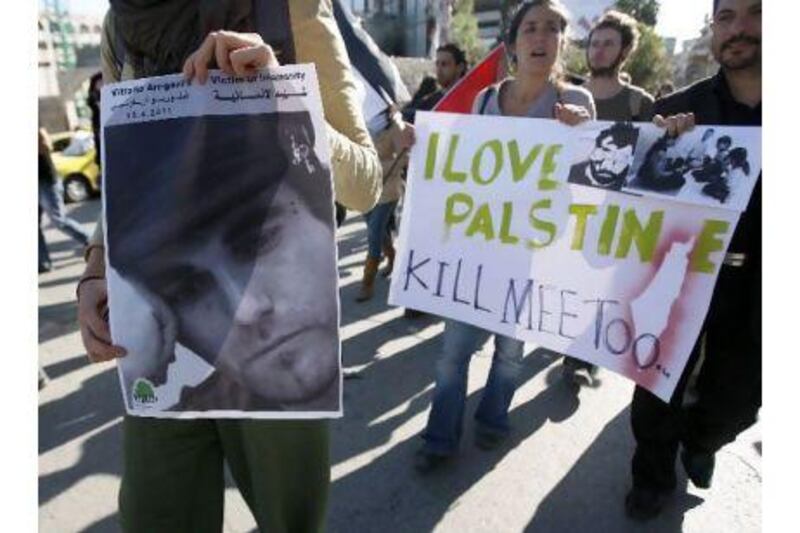JERUSALEM // The murder of an Italian activist in Gaza last week has raised questions about the capability of Hamas to control radical groups, some with suspected links to al Qa'eda, operating in the Palestinian territory.
Vittorio Arrigoni, 36, part of the pro-Palestinian International Solidarity Movement, was found dead in an empty apartment building in Gaza City. An al Qa'eda-inspired group calling itself Tawhid and Jihad released a video of his kidnapping on Thursday and is widely believed to have carried out the murder.
While Hamas officials have denounced the killing and ordered an investigation, the incident has undoubtedly been embarrassing. It was the first known kidnapping of a Westerner in Gaza since 2007 and has raised doubts about Hamas-imposed security.
Even though the group has prided itself on its ability to maintain order in Gaza, Hani Habib, a Palestinian political analyst, said Arrigoni's murder was "a sign of doubts over the security situation in Gaza and whether it is as stable as Hamas says".
Challenging the group's authority is a combination of factors that analysts say may well become more problematic as a result of Israel's siege of Gaza and Hamas' apparent transformation from resistance group to de facto government.
An unknown number of militant and Islamist organisations appear to be gaining influence in Gaza and directing their anger at Hamas.
"These other groups are in opposition to Hamas' policy because they feel they are the only ones who are resisting Israel," said Talal Okal, a political analyst who lives in Gaza.
Mr Okal and others point to a number of shadowy Jihadi-Salafi cells that are critical of Hamas' preference for restraining, rather than encouraging, militant activities against Israel. During the recent flare-up of rocket and mortar exchanges with Israel, Hamas was credited in Gaza for halting the violence before it escalated.
Earlier this month, Hamas agents even shot militants trying to fire mortars into Israel, which Mr Okal said underscored the group's willingness to "violently" suppress dissent.
George Giacaman, a professor of political science at Birzeit University in the West Bank, believes the challenge presented by these organisations is partly the result of Hamas' inability to define itself as either an armed resistance group or governing power.
"Hamas is facing a dilemma in that it cannot be a resistance group and a government as well," he said.
"The situation can't hold indefinitely, and it could be argued that Hamas is no longer even a resistance movement."
The result, he added, was that these more militant organisations "will continue bothering Hamas as long as Hamas is trying to control" their militant activities.
Palestinian analysts argue, however, that few such groups now possess enough strength to seriously challenge Hamas. But there is concern that Gaza's bleak living conditions have created a breeding ground for militancy far more hostile than Hamas, which in recent years has tried to present a friendlier face to the West.
In a report last month, the International Crisis Group warned about the influence of these groups, arguing that they "pose both a practical and an ideological threat" to Hamas.
"As progress toward normalising life, engaging the world or achieving a prisoner exchange stalls, the uncompromising outlook of the Salafi-Jihadis becomes more appealing to militants," the report said.
Hamas in recent years has had to deal with groups more radical than itself. In 2009, one Islamist organisation opposed to Hamas declared Gaza an Islamic emirate. Hamas responded brutally, killing 24 people, including the group's leader. Others are suspected to have carried out firebombings of hair salons and other places considered to be immoral. Tawhid and Jihad appeared intent on killing Arrigoni despite claiming he would be released if Hamas freed the group's imprisoned members.
Given the strength of Hamas rule in Gaza, there are doubts that these fringe militant groups could operate independently. Some suspect that Hamas, or at least some of its members, may be lending them tacit support.
Even though they may now oppose official Hamas policy, these "groups are comprised mostly of former members of Hamas and other established factions", according to the International Crisis Group report.
Musa al Budeiri, professor of political science at Birzeit University, said, "One has to ask why Hamas allows these groups to continue to exist. Obviously, someone in Hamas must look benevolently on their existence."
* With additional reporting from Reuters





